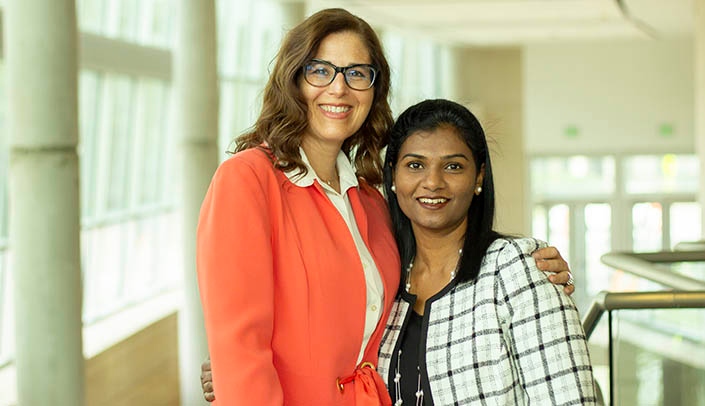UNMC’s cytotechnology program in the College of Allied Health Professions, has been receiving national and international attention — and requests for collaboration — for its innovative use of virtual microscopy in online education.
Collaborators
Current collaborators include:
- The Carle Foundation Hospital in Urbana, Ill.
- University of California-Davis Medical Center in Sacramento, Calif.
- The Ohio State Wexner Medical Center in Columbus, Ohio
- BayCare Health System in the Tampa Bay, Fla., area; and,
- beginning in 2019, Massachusetts General Hospital in Boston.
Virtual microscopy is a technology in which glass slides are converted into digital images.
“We are the only program in the United States that is teaching via virtual microscopy,” said Amber Donnelly, Ph.D., director of the program, who recently published a study on the subject in CytoJournal.
During her Ph.D. on investigating the incorporation of virtual microscopy technology in cytotechnology education, Maheswari Mukherjee, Ph.D., built the virtual microscopy database and worked with Dr. Donnelly to research whether virtual learning could be applied to microscopy. Dr. Donnelly said the studies have brought collaborators calling. (See sidebar.)
Drs. Donnelly and Mukherjee spearheaded the program as a way to provide educational opportunities at sites that don’t have access to a cytotechnology education program. Currently there are only 22 accredited programs in the U.S. and the programs are generally small because of the microscopy and one-on-one time needed for training. However, UNMC has found a way to grow the program through distance education and has doubled its class size.
“In order to enhance our online learning, we created e-learning modules explaining the cytology hands-on procedures such as preparing and staining the glass slides,” Dr. Mukherjee said. “If the students aren’t able to get hands-on experiences in the laboratory, they will not achieve the competencies necessary. So we put virtual microscopy technology and e-learning modules together to make a complete online education program.”
The program also takes what it calls “anytime, anywhere students” — usually current workers in a lab that is paying for their education and willing to participate in the hands-on training at their site.
“This current academic year we have two of those students, in Baltimore and Chicago, and this coming academic year we’ll have one in Texarkana, Texas,” Dr. Donnelly said.
The program goes international in 2019.
“Hopefully, by August 2019, we’ll be starting with Hamad Medical Corporation in Qatar in the Middle East, and we’ll have six to eight additional students,” Dr. Donnelly said.
“We’re in a good position to grow it even more nationwide, because we keep getting new contacts every year. We’re not only going to grow here, but we have connections in a lot of different countries that would like for us to help — a lot of them need cytology, but don’t have the funding to start their own program. The international locations interested in our online program are Peru, India, Rwanda and Qatar. Also, I think a lot of medical residents in the U.S. who study cytology would use our online program,” she said.

Congratulations to Amber and Manju for having the foresight and ambition to carry out this project!
Congratulations Amber and Manju.
Excellent, innovative work! Proud to be able to work with you as part of the College of Allied Health Professions!
Great idea & fantastic work.
How wonderful! Congratulations!
Congratulations on the growth of your program. Amber and Manju are continually looking for opportunities to enhance education face to face and at a distance.